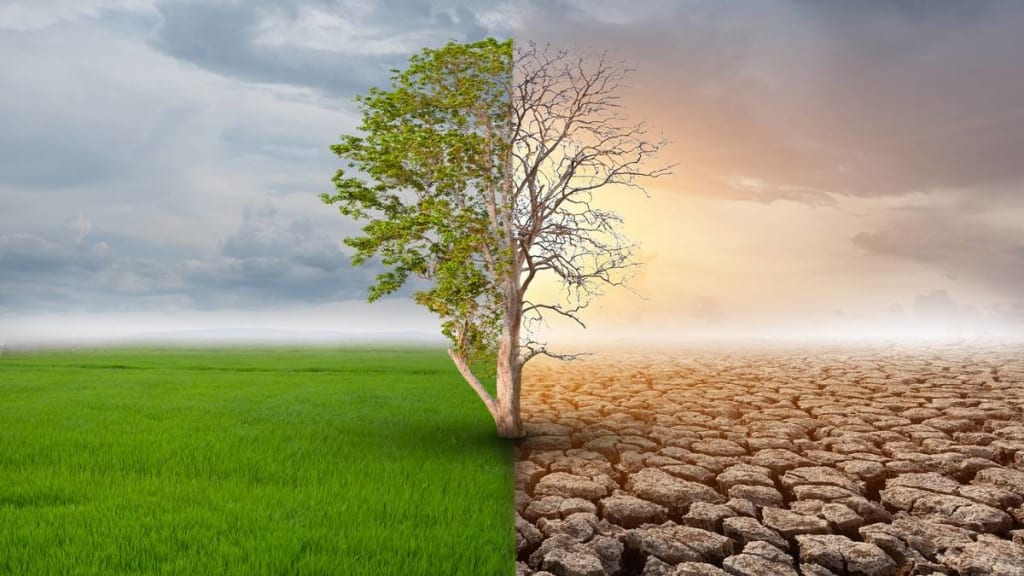Climate Change
A Pressing Global Challenge Demanding Urgent Action

Introduction:
Climate change has emerged as one of the most pressing issues facing the world today. The Earth's climate is rapidly changing due to human activities, resulting in severe consequences for the environment, societies, and future generations. From extreme weather events to rising sea levels, the impacts of climate change are being felt across the globe. This article aims to shed light on the urgent need for collective action to address this crisis and explores potential solutions to mitigate its effects.
The Reality of Climate Change:
Scientific evidence overwhelmingly supports the fact that human activities, primarily the burning of fossil fuels and deforestation, are contributing to the increase in greenhouse gas emissions and subsequent global warming. The Earth's average temperature has already risen by 1 degree Celsius since the pre-industrial era, and if left unchecked, it is projected to rise beyond the critical threshold of 1.5 degrees Celsius by the end of the century.
Consequences and Impacts:
The consequences of climate change are wide-ranging and severe. More frequent and intense heatwaves, droughts, hurricanes, and floods have become the new norm, leading to loss of lives, displacement of communities, and significant damage to infrastructure and ecosystems. Rising sea levels pose a threat to coastal cities and island nations, jeopardizing their existence. Moreover, climate change exacerbates existing inequalities, disproportionately affecting vulnerable communities, and threatening food security and water resources.
The Importance of Urgent Action:
Time is of the essence when it comes to addressing climate change. Delaying action will only exacerbate the challenges and make it harder to achieve meaningful solutions. The Paris Agreement, signed by nearly all countries in 2015, set a framework for global cooperation to limit global warming well below 2 degrees Celsius. However, current emission reduction commitments fall short of what is required to achieve this target. Urgent and ambitious action is needed at all levels, from individuals and communities to businesses and governments.
Mitigation and Adaptation Strategies:
Mitigating climate change requires a two-pronged approach. Firstly, reducing greenhouse gas emissions is crucial. This entails transitioning to renewable energy sources, increasing energy efficiency, and promoting sustainable transportation and agriculture practices. Phasing out coal-fired power plants, investing in clean technologies, and promoting reforestation efforts are also vital steps towards mitigating climate change.
Secondly, adaptation strategies are necessary to cope with the changes that are already occurring. This includes implementing climate-resilient infrastructure, enhancing early warning systems, and developing robust disaster management plans. Investing in research and development of climate-smart technologies and supporting vulnerable communities to adapt to changing conditions are essential components of adaptation efforts.
International Cooperation:
Climate change is a global issue that requires international cooperation and collaboration. Countries must work together to develop and implement effective policies and strategies. The transfer of clean technologies and financial support to developing nations is crucial to ensure their active participation in climate action. International forums and initiatives, such as the United Nations Framework Convention on Climate Change (UNFCCC), provide platforms for negotiation and coordination, fostering global solidarity in addressing the climate crisis.
Individual Responsibility:
While governments and businesses play a pivotal role, individual actions also contribute to mitigating climate change. Adopting sustainable practices in our daily lives, such as reducing energy consumption, minimizing waste, and embracing eco-friendly modes of transportation, can collectively make a significant impact. Additionally, raising awareness, advocating for policy changes, and supporting organizations working on climate-related issues are valuable ways for individuals to contribute to the cause.
Conclusion:
Climate change represents an existential threat to humanity and the planet. Urgent action is required on a global scale to mitigate its impacts and build a more sustainable future. By embracing renewable energy, implementing adaptation strategies, fostering international cooperation, and promoting individual responsibility, we can address this pressing





Comments
There are no comments for this story
Be the first to respond and start the conversation.